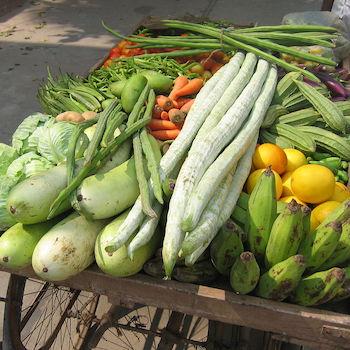Scaring old people is a time-tested strategy to scrounge up votes ("He'll take away your Medicare!") or to steal money ("Your Social Security number has been compromised. Please send payment.")
The coronavirus has made scamming even easier. The Consumer Financial Protection Bureau warns that scammers are offering vaccines and cures (neither exist) or soliciting money for phony charities.
Not to be outdone, the good folks over at the AARP (American Association of Retired Persons) decided to scare old people about the food in the grocery store. And, as an added bonus, the article was written by Mark Bittman, the guy who used to plug organic food and other pseudoscientific nonsense for the New York Times. How big of a scaremonger is Bittman? He once cited "research" claiming that GMOs cause leukemia.
AARP Scares Old People into Eating More Expensive Organic Food
In other words, Bittman is perfect for the AARP. True to form, he begins lying early and often in his article for AARP The Magazine:
Does any old apple a day keep the doctor away? Or does it have to be organic? The answer is, honestly, “That's impossible to say right now.”
Actually, it's not. The answer is "no." There's nothing magical about apples. They are very healthy (mostly because of the fiber), but you can eat other things if you don't like apples. And there's especially nothing magical about organic apples. Your body can't tell the difference if the apple was grown on a corporate farm or in your cousin Jim Bob's backyard.
Bittman goes on to describe a study that showed that people who ate organic food had lower rates of cancer. To his credit, he actually explains why this could be the result of confounding; i.e., people who go out of their way to eat organic food are probably wealthy and obsessed with their health. Yet, he still says this:
[F]or the first time, we have a strong association between routine consumption of organic food and an important health outcome.
No! You can't explain away the results and then accept the results anyway because you like them. Bittman continues:
Why is it worth spending extra time and, usually, money to eat locally? Reducing the carbon footprint...
Wrong again. As Our World in Data explains, "Eating locally would only have a significant impact if transport was responsible for a large share of food’s final carbon footprint. For most foods, this is not the case." Instead, if you are concerned about your carbon footprint, then you should focus on the types of food that you eat. For instance, beef is very carbon intensive, regardless if it's local or not.
No one but a fanatic could eat only local food, but concentrating on these attributes would mean you were eating better, more ethically...
Ah yes. Now, we get an ethics lesson. You see, Mark Bittman is a better person than you. And if you eat like he does, you'll be better than all the riffraff around you, too.
If you know your produce is being grown on a local farm where chemicals are not being used, you know that you are avoiding those chemicals.
I couldn't go any further. I stopped reading at this point. My neurons are under assault, and I'm not getting any hazard pay for putting them at risk. (Okay, okay. I skimmed ahead and saw that Bittman made a bunch of grand, sweeping claims about soil quality and animal diet. It's highly likely that Bittman is exaggerating.) To top it all off, the AARP article came with the thoroughly debunked and unscientific "Dirty Dozen" list (a list of fruits and vegetables the Environmental Working Group falsely claims that people should avoid because of pesticides).
Scaring old people is hard work. Good thing the AARP is here to do it by encouraging older people on limited incomes to eat expensive organic food.




